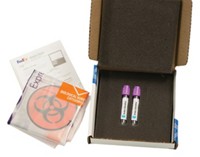Advertisement
Grab your lab coat. Let's get started
Welcome!
Welcome!
Create an account below to get 6 C&EN articles per month, receive newsletters and more - all free.
It seems this is your first time logging in online. Please enter the following information to continue.
As an ACS member you automatically get access to this site. All we need is few more details to create your reading experience.
Not you? Sign in with a different account.
Not you? Sign in with a different account.
ERROR 1
ERROR 1
ERROR 2
ERROR 2
ERROR 2
ERROR 2
ERROR 2
Password and Confirm password must match.
If you have an ACS member number, please enter it here so we can link this account to your membership. (optional)
ERROR 2
ACS values your privacy. By submitting your information, you are gaining access to C&EN and subscribing to our weekly newsletter. We use the information you provide to make your reading experience better, and we will never sell your data to third party members.
Policy
Civil Libertarians Seek Second Supreme Court Review Of Gene Patents
Biotechnology: ACLU aims to nullify Myriad Genetics’ patents on cancer genes
by Glenn Hess
October 4, 2012
| A version of this story appeared in
Volume 90, Issue 41
The American Civil Liberties Union (ACLU) is again asking the Supreme Court to invalidate Myriad Genetics’ patents on two human genes associated with hereditary breast and ovarian cancers. The lawsuit contends that the patents are illegal because genes are “products of nature.”
The ACLU asked the Supreme Court to review the case last year. Rather than settling the dispute, the justices sent the case back to the U.S. Court of Appeals for the Federal Circuit. The high court ordered the appeals court to reconsider its July 2011 decision upholding the patents in light of a ruling last spring by the Supreme Court in a related patent case (Mayo Collaborative Services v. Prometheus Labs) that companies cannot patent observations about natural phenomena.
By a 2-1 vote, the appeals court ruled again in August that companies can obtain patents on human genes (C&EN, Aug. 27, page 8). The Supreme Court will now decide whether to hear the case or let the appeals court ruling stand.
“In our view, the Court of Appeals did not fully consider or correctly apply the Supreme Court’s most recent and relevant patent law decisions,” ACLU attorney Chris Hansen says.
Myriad asserts that the appeals court properly “confirmed that isolated DNA is patentable.” The biotech company says it “strongly believes that its patents are valid and enforceable.”
Since a 1980 landmark Supreme Court decision involving genetically engineered microorganisms, the Patent & Trademark Office has granted tens of thousands of gene-related patents, which cover a large number of pharmaceutical and diagnostic products.




Join the conversation
Contact the reporter
Submit a Letter to the Editor for publication
Engage with us on Twitter